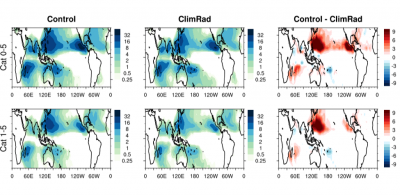The Role of Radiative Feedbacks on Tropical Cyclone Development
The influence of clouds on the radiative heating of the atmosphere is shown to play a critical role in the development and intensification of tropical cyclones (TCs) in a high-resolution global atmospheric model.
Improved representation of these radiative processes in forecast models can lead to better predictions of tropical cyclone genesis and intensification.
The processes that influence the genesis and development of tropical cyclones (TCs) remain poorly understood, particularly when the storms are at their earliest stages of development. Most previous work has been performed using highly idealized models that neglect critical processes like wind shear or sea surface temperature gradients. We use a high-resolution global atmospheric model to demonstrate that radiative feedbacks play a critical role in the development of tropical cyclones under realistic conditions. When radiative feedbacks on the organization of convection are artificially suppressed, the frequency of TCs is reduced by ~30%. The largest reduction is shown to occur at the initial stages of development when the vortices are weak and radiative heating provides a relatively larger source of energy compared to when storms are more fully developed. This suggests that better representation of these feedbacks in forecast models can improve the representation of TC genesis and intensification.

